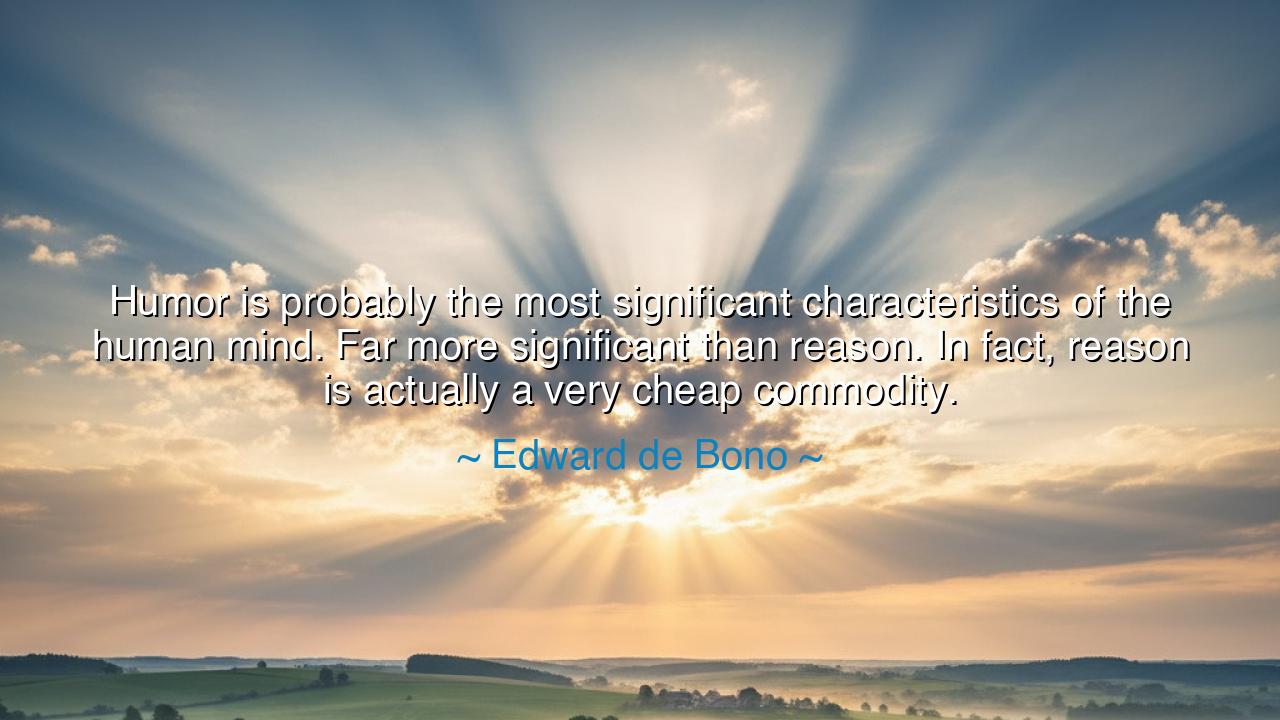
Humor is probably the most significant characteristics of the
Humor is probably the most significant characteristics of the human mind. Far more significant than reason. In fact, reason is actually a very cheap commodity.






“Humor is probably the most significant characteristic of the human mind. Far more significant than reason. In fact, reason is actually a very cheap commodity.”
Thus spoke Edward de Bono, the father of creative thinking, whose words cut to the heart of what separates humanity from all other living beings. In this statement, he overturns the ancient idol of reason, that cold and exalted logic that philosophers once held above all else, and instead raises humor — that strange, luminous spark that dances between absurdity and wisdom — to its rightful throne. For humor, he says, is not a triviality, but the highest expression of intelligence, the mark of a mind both free and alive.
To claim that humor surpasses reason is not to despise intellect, but to recognize its limits. Reason follows the straight road — it is predictable, methodical, safe. But humor leaps sideways; it sees connection where logic sees separation. It is the mind’s rebellion against rigidity, the laughter of understanding that breaks the boundaries of convention. De Bono, who spent his life teaching the art of “lateral thinking,” knew that humor and creativity share the same source: both depend on seeing differently, on twisting perception until truth reveals itself from an unexpected angle. Humor, therefore, is the flowering of imagination, not merely a reaction to jest. It is wisdom in motion.
The ancients knew this long before our age. The Greek sage Democritus, known as “the laughing philosopher,” found humor not in mockery but in the folly of human pretension. He saw that those who could laugh at life possessed a kind of mastery over it — for laughter dissolves fear, pride, and despair. His contemporaries called him mad, for they could not understand how one could laugh at suffering. But Democritus laughed because he understood — he knew that the world’s tragedy was inseparable from its beauty, and that to live without humor was to be enslaved by the seriousness of existence. So too did Edward de Bono understand that the mind capable of humor is the mind capable of transcendence.
When de Bono calls reason a “cheap commodity,” he does not belittle logic itself, but its narrowness. Reason is easy; it can be taught, measured, and replicated by machines. But humor — true, subtle, life-giving humor — cannot be programmed. It belongs only to consciousness, to that mysterious capacity to hold contradiction and still smile. A computer can compute a joke, but it cannot feel it. In humor, man reveals the divine within him — for only the divine can hold paradox without breaking. Reason divides, but humor unites. Where logic seeks to win, humor seeks to understand; where logic ends in conclusion, humor begins in insight.
Consider the story of Abraham Lincoln, who led his nation through its bloodiest trial. In the darkest days of the Civil War, when the fate of millions hung in balance, Lincoln would often break tension with a story or a dry jest. His humor, born not of lightness but of sorrow, disarmed bitterness and restored perspective. One evening, after learning of a devastating defeat, an aide found him chuckling over a book of jokes. When asked how he could laugh in such a moment, Lincoln said, “If I could not laugh, I should die.” This was not escapism — it was wisdom. He knew that humor restores the soul when reason fails to comfort it.
In this way, humor is the soul’s resilience. It is the act of the mind refusing despair, of the heart insisting on joy amid ruin. Reason may tell us what the world is, but humor reminds us that it could be otherwise. It is the imagination’s rebellion against rigidity, the proof that human beings can rise above logic, cruelty, and inevitability. The one who can laugh is free — for laughter is not the denial of truth, but its embrace from a higher vantage.
So let this be the teaching drawn from Edward de Bono’s words:
-
Cherish humor, for it is the breath of the creative spirit.
-
Do not worship reason, for reason alone can only repeat what already is.
-
Learn to laugh at yourself, for in that laughter lies humility and growth.
-
Use humor as a bridge, for it connects minds more swiftly than argument ever could.
Thus spoke Edward de Bono, a man who saw laughter not as frivolity but as the crown of thought. His message endures as a challenge to all who prize intellect over imagination: do not seek only to reason — seek also to delight, to wonder, to smile at life’s contradictions. For it is humor, not reason, that saves the mind from stagnation and the soul from despair. And so, O seeker of wisdom, remember — the wisest mind is not the one that reasons endlessly, but the one that, having reasoned, still has the courage to laugh.






AAdministratorAdministrator
Welcome, honored guests. Please leave a comment, we will respond soon